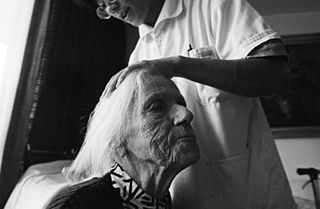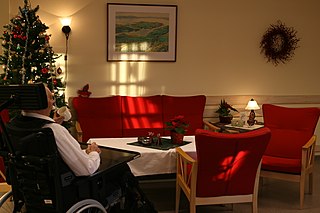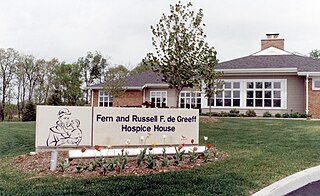Related Research Articles
Occupational therapists (OTs) are health care professionals specializing in occupational therapy and occupational science. OTs and occupational therapy assistants (OTAs) use scientific bases and a holistic perspective to promote a person's ability to fulfill their daily routines and roles. OTs have training in the physical, psychological, and social aspects of human functioning deriving from an education grounded in anatomical and physiological concepts, and psychological perspectives. They enable individuals across the lifespan by optimizing their abilities to perform activities that are meaningful to them ("occupations"). Human occupations include activities of daily living, work/vocation, play, education, leisure, rest and sleep, and social participation.

Home care is supportive care provided in the home. Care may be provided by licensed healthcare professionals who provide medical treatment needs or by professional caregivers who provide daily assistance to ensure the activities of daily living (ADLs) are met. In-home medical care is often and more accurately referred to as home health care or formal care. Home health care is different non-medical care, custodial care, or private-duty care which refers to assistance and services provided by persons who are not nurses, doctors, or other licensed medical personnel. For patients recovering from surgery or illness, home care may include rehabilitative therapies. For terminally ill patients, home care may include hospice care.
Palliative care is an interdisciplinary medical caregiving approach aimed at optimizing quality of life and mitigating suffering among people with serious, complex, and often terminal illnesses. Within the published literature, many definitions of palliative care exist. The World Health Organization (WHO) describes palliative care as "an approach that improves the quality of life of patients and their families facing the problems associated with life-threatening illness, through the prevention and relief of suffering by means of early identification and impeccable assessment and treatment of pain, illnesses including other problems whether physical, psychosocial, and spiritual". In the past, palliative care was a disease specific approach, but today the WHO takes a broader patient-centered approach that suggests that the principles of palliative care should be applied as early as possible to any chronic and ultimately fatal illness. This shift was important because if a disease-oriented approach is followed, the needs and preferences of the patient are not fully met and aspects of care, such as pain, quality of life, and social support, as well as spiritual and emotional needs, fail to be addressed. Rather, a patient-centered model prioritizes relief of suffering and tailors care to increase the quality of life for terminally ill patients.
A nursing home is a facility for the residential care of older people, senior citizens, or disabled people. Nursing homes may also be referred to as care homes, skilled nursing facilities (SNF) or long-term care facilities. Often, these terms have slightly different meanings to indicate whether the institutions are public or private, and whether they provide mostly assisted living, or nursing care and emergency medical care. Nursing homes are used by people who do not need to be in a hospital, but require care that is hard to provide in a home setting. The nursing home staff attends to the patients' medical and other needs. Most nursing homes have nursing aides and skilled nurses on hand 24 hours a day.
Terminal illness or end-stage disease is a disease that cannot be cured or adequately treated and is expected to result in the death of the patient. This term is more commonly used for progressive diseases such as cancer, dementia or advanced heart disease than for injury. In popular use, it indicates a disease that will progress until death with near absolute certainty, regardless of treatment. A patient who has such an illness may be referred to as a terminal patient, terminally ill or simply as being terminal. There is no standardized life expectancy for a patient to be considered terminal, although it is generally months or less. Life expectancy for terminal patients is a rough estimate given by the physician based on previous data and does not always reflect true longevity. An illness which is lifelong but not fatal is a chronic condition.
Gentiva Health Services is a provider of home health care, hospice, and related health services in the United States. The company is headquartered in Atlanta, Georgia. Prior to its October 2014 acquisition by Kindred Healthcare, it was a Fortune 1000 company with over $1.7 billion in annual revenue and a member of the S&P 600 index.

Elderly care, or simply eldercare, serves the needs of old adults. It encompasses assisted living, adult daycare, long-term care, nursing homes, hospice care, and home care.

Long-term care (LTC) is a variety of services which help meet both the medical and non-medical needs of people with a chronic illness or disability who cannot care for themselves for long periods. Long-term care is focused on individualized and coordinated services that promote independence, maximize patients' quality of life, and meet patients' needs over a period of time.
Residential care refers to long-term care given to adults or children who stay in a residential setting rather than in their own home or family home.
Private duty nursing is the care of clients by nurses, who may be licensed as RNs or LPNs/LVNs.
Program of All-inclusive Care for the Elderly (PACE) are programs within the United States that provide comprehensive health services for individuals age 55 and over who are sufficiently frail to be categorized as "nursing home eligible" by their state's Medicaid program. The ultimate goal of PACE programs is to keep eligible older adults out of nursing homes and within their communities for as long as possible. Services include primary and specialty medical care, nursing, nutrition, social services, therapies, pharmaceuticals, day health center services, home care, health-related transportation, minor modification to the home to accommodate disabilities, and anything else the program determines is medically necessary to maximize a member's health. If you or a loved one are eligible for nursing home level care but prefer to continue living at home, a PACE program can provide expansive health care and social opportunities during the day while you retain the comfort and familiarity of your home outside of day hours.
In the United States, Medicare fraud is the claiming of Medicare health care reimbursement to which the claimant is not entitled. There are many different types of Medicare fraud, all of which have the same goal: to collect money from the Medicare program illegitimately.
Spartanburg Regional Healthcare System(SRHS) is one of South Carolina's largest healthcare systems. SRHS draws patients primarily from the areas of Spartanburg, Cherokee, Union, and Greenville counties (all located in the Piedmont region of South Carolina), as well as Rutherford and Polk counties (located in western North Carolina). Spartanburg General Hospital was organized under the authority of the South Carolina General Assembly in 1917. It officially became the Spartanburg Regional Health Services District, Inc., a political subdivision of the State of South Carolina, by the charter granted by the Secretary of State of South Carolina on May 1, 1995.
Rainbow Hospice and Palliative Care, founded in 1981, is one of the oldest and largest non-profit hospice and palliative care providers in Illinois.
A professional live-in caregiver provides personal care and assistance to individuals, including those suffering from chronic illness, Alzheimer's disease, and dementia, within the home setting. Typical duties of a live-in caregiver include meal planning and preparation, assistance with grooming, dressing and toileting, medication management, laundry and light housekeeping, and transportation/escorts to doctor's appointments or social engagements. Professional live-in caregivers are often provided by an outside agency, which may also coordinate their services with the client's preferred in-home health agency and other medical providers.

In the United States, hospice care is a type and philosophy of end-of-life care which focuses on the palliation of a terminally ill patient's symptoms. These symptoms can be physical, emotional, spiritual, or social in nature. The concept of hospice as a place to treat the incurably ill has been evolving since the 11th century. Hospice care was introduced to the United States in the 1970s in response to the work of Cicely Saunders in the United Kingdom. This part of health care has expanded as people face a variety of issues with terminal illness. In the United States, it is distinguished by extensive use of volunteers and a greater emphasis on the patient's psychological needs in coming to terms with dying.
Hospice Savannah is a non-profit hospice based in Savannah, Georgia that was started in 1979. Hospice Savannah provides its services to an average of 200 terminally ill patients at a time in Chatham, Effingham, Bryan, Long, and Liberty counties. Being non-profit, Hospice Savannah is community-based and is a member agency of the United Way of the Coastal Empire. It is certified by Medicare and Medicaid and will provide its services to any patient regardless of any financial situations. It employs around 200 people and also receives support from its large volunteer group.

Hospice care is a type of health care that focuses on the palliation of a terminally ill patient's pain and symptoms and attending to their emotional and spiritual needs at the end of life. Hospice care prioritizes comfort and quality of life by reducing pain and suffering. Hospice care provides an alternative to therapies focused on life-prolonging measures that may be arduous, likely to cause more symptoms, or are not aligned with a person's goals.
Pediatric Home Service is an independent home health care provider. PHS provides in-home care to medically-complex children in Minnesota and is certified by The Joint Commission. PHS offers in-home pediatric health care services.
As of 2017, approximately 1.4 million Americans live in a nursing home, two-thirds of whom rely on Medicaid to pay for their care. Residential nursing facilities receive Medicaid federal funding and approvals through a state health department. These facilities may be overseen by various types of state agency.
References
- 1 2 De Vliegher, Kristel; Aertgeerts, Bert; Declercq, Anja; Moons, Philip (December 2015). "Exploring the activity profile of health care assistants and nurses in home nursing". British Journal of Community Nursing. 20 (12): 608–614. doi:10.12968/bjcn.2015.20.12.608. PMID 26636895.
- ↑ "What's home health care?". www.medicare.gov. Medicare.gov. Archived from the original on 26 February 2016. Retrieved 5 October 2017.
- ↑ "Home Health Nurses Association". National Association for Home Care & Hospice. Archived from the original on October 1, 2018. Retrieved October 27, 2017.
- ↑ "Lillian Wald". Henry Street Settlement. Retrieved 5 October 2017.
- 1 2 3 Stanhope, Marcia; Lancaster, Jeanette (2014). Foundations of nursing in the community: community-oriented practice (4th ed.). St. Louis, Missouri: Elsevier/Mosby. pp. 549–563. ISBN 978-0-323-10094-6.
- ↑ "Metropolitan Life Insurance's Health Campaign". University of Virginia Historical Collections at the Claude Moore Health Sciences Library. Rector and Visitors of the University of Virginia. Retrieved 5 October 2017.
- 1 2 3 4 Ellenbecker, Carol Hall; Samia, Linda; Cushman, Margaret J.; Alster, Kristine (2008). "Patient Safety and Quality in Home Health Care". National Center for Biotechnology Information. Agency for Healthcare Research and Quality (US). PMID 21328733 . Retrieved 24 September 2017.
- ↑ De Vliegher, Kristel; Aertgeerts, Bert; Declercq, Anja; Moons, Philip (December 2015). "Exploring the activity profile of health care assistants and nurses in home nursing". British Journal of Community Nursing. 20 (12): 608–614. doi:10.12968/bjcn.2015.20.12.608. PMID 26636895.
- 1 2 Stanhope, Marcia; Lancaster, Jeanette (2014). Foundations of nursing in the community: community-oriented practice (4th ed.). St. Louis, Missouri: Elsevier/Mosby. pp. 549–563. ISBN 978-0-323-10094-6.
- ↑ "Home Health Care Vs. Hospice Care: What Is the Difference? - Safe Hands Home Health & Hospice". 2024-08-21. Retrieved 2023-05-04.
- ↑ "Home Health Care Nurse". DiscoverNursing.com. Johnson and Johnson. Retrieved 5 October 2017.
- 1 2 Gay, James C.; Thurm, Cary W.; Hall, Matthew; Fassino, Michael J.; Fowler, Lisa; Palusci, John V.; Berry, Jay G. (Nov 2016). "Home Health Nursing Care and Hospital Use for Medically Complex Children". Pediatrics. 138 (5): e20160530. doi: 10.1542/peds.2016-0530 . PMID 27940764.
- 1 2 3 4 5 6 7 "Medicare and Home Health Care" (PDF). Department of Health and Human Services. 3 November 2017.